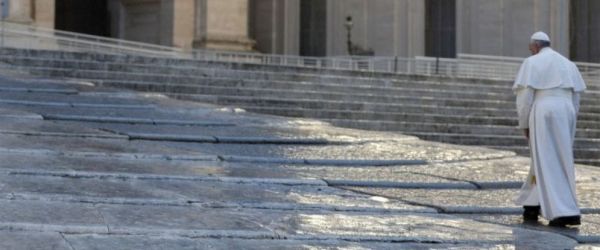[The Jubilee Year 2021 dedicated to the Apostle James, whose remains, preserved in the Cathedral, are visited by countless pilgrims, has begun in Santiago de Compostela, in the region of Galicia, Spain. In the message sent by Francis, the invitation to a journey of conversion and solidarity with one's fellow travellers].
It opened on 31 December 2020, the Compostelan Year, a jubilee that is declared for the year in which 25 July, the memorial of St James the Martyr, falls on a Sunday. This will be the case in 2021. The theme of the event is "Come out of your land! The Apostle is waiting for you'.The announcement by the Archbishop of Santiago de Compostela, Monsignor Julián Barrio Barrio to all the faithful speaks of "a year of grace and forgiveness" for all those who wish to participate. "In this third Holy Year of Compostela in the third millennium of Christianity," the archbishop continues, "the courageous witness of the apostle St James is an opportunity to rediscover the vitality of faith and mission, received at Baptism.
Pope Francis' message at the opening of the Holy Door
And it is to Monsignor Julián Barrio Barrio that the message that Pope Francis sent on the occasion of the opening of the Holy Door is addressed, to express his affection and closeness "to all those who participate in this moment of grace for the whole Church, and in particular for the Church in Spain and Europe". "Following in the footsteps of the Apostle," writes Pope Francis, "we leave our selves, those securities to which we cling, but with a clear objective in mind, we are not wandering beings, always revolving around ourselves without getting anywhere. It is the voice of the Lord that calls us and, as pilgrims, we welcome it in an attitude of listening and seeking, undertaking this journey to encounter God, others and ourselves".
God's mercy accompanies our journey
The destination, the Pope emphasises, is as important as the journey towards it, which is a journey of conversion following Jesus Way, Truth and Life. Quoting the Apostolic Letter "Misericordia et misera" of 20 November 2016, the text continues with a message that reassures: "On this journey God's mercy accompanies us and even if the condition of weakness due to sin remains, it is overcome by the love that allows us to look to the future with hope and to be ready to put our lives back on the right path.
We walk lightly and in company
To set out on the journey we must first of all detach ourselves from the things that weigh us down, but then in life we do not walk alone and relying on our companions without suspicion and mistrust "helps us to recognise in our neighbour a gift that God gives us to accompany us on this journey". It is a matter of "going out of ourselves to join with others", of expecting and supporting one another, sharing labours and achievements. At the end of the journey, the Pope writes, we will find ourselves with an empty rucksack, but with "a heart full of experiences forged in contrast and in harmony with the lives of our other brothers and sisters who come from different existential and cultural contexts". And rediscovering our duty to be missionary disciples "to call everyone to that homeland towards which we are moving".
The pilgrim communicates faith with his life
Francis describes the pilgrim as one who is capable of placing himself in God's hands, aware that the promised homeland is already present in Christ who is close to him and thus "touches the heart of his brother, without artifice, without propaganda, in the outstretched hand ready to give and to take". The three gestures that pilgrims make on arriving at the Holy Door, remind us of the reason for the journey, the Pope goes on to write: the first "is to contemplate in the Portico of Glory the serene gaze of Jesus, the merciful judge", who welcomes us into his home. The second is the embrace that comes to us from the image of the Apostle James who shows us the way of faith. Participation in the Eucharistic celebration, the third gesture, invites us "to feel that we are the people of God", called "to share the joy of the Gospel".
Ferment in the city of the Apostle
It was 1122 when the Holy Year originated and has been celebrated every 6, 5, 6 and 11 years since then. This makes about 14 jubilee years every century. The opening of the door of the Cathedral of Santiago, where the relics of the Apostle James, architect of the Hispanic evangelisation, are kept, is creating a restrained ferment in the Galician city. It is precisely to this land and its coasts that the silhouette of the scallop depicted in the event's logo, a universal symbol of the Way of Compostela, refers. It also features the emblematic cross of Santiago and a fan of rays representing brotherhood between peoples of all races and cultures. Millions of people undertake the pilgrimage along the Way - Europe's first cultural route and a World Heritage Site, one of the oldest and most important routes of Christianity - every year.
In the Cathedral a renewed beauty
In 2020, pilgrimages were suspended due to the pandemic, but the lockdown period was used to carry out restoration work on the Cathedral, which now shines with a more idealised illumination and everything glows with renewed beauty. And it is under the sign of the contemplation of beauty and hope, while the pilgrimages have officially resumed but the ongoing health emergency prevents the arrival of the walkers, that the Holy Year opens.
[Adriana Masotti and Antonella Palermo -
https://www.vaticannews.va/it/papa/news/2021-01/il-papa-per-l-anno-compostelano.html]












